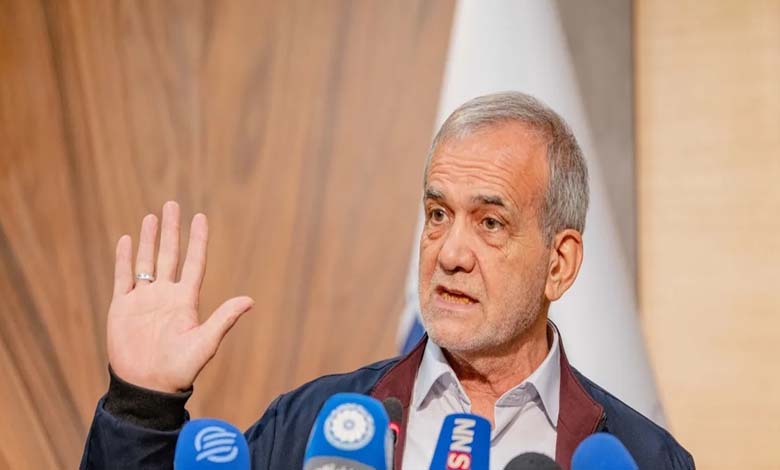Bazeshkian explores, in his first meeting with al-Burhan, the expansion of Iranian influence in Sudan
The head of the Sovereign Council seeks to gain additional Iranian military support in the face of Rapid Support Forces.

The President of the Sovereign Council in Sudan, Abdel Fattah al-Burhan, discussed Wednesday with Iranian President Masoud Pezeshkian the developments in the situation in the Arab country, as well as bilateral cooperation between the two nations, during their meeting in New York, on the sidelines of the 79th session of the United Nations General Assembly, according to a statement from the Sudanese Sovereign Council. This meeting comes as Tehran raises concerns within the international community due to its increasing intervention in the Sudanese crisis through arming the Sudanese army, threatening to prolong the war.
-
Military Cooperation between Sudan and Iran: New Details Revealing the Complexity of the Strategic Alliance
-
Implications and Dimensions of Iranian Support in Sudan
The statement noted that the two sides examined “the developing relations between the two countries and ways to support bilateral cooperation.” They also addressed “the overall situation in Sudan,” while al-Burhan briefed the Iranian president in their first meeting about what he referred to as “the rebellion of the Rapid Support militia against the state and its institutions.”
Through this initial meeting, the Iranian president seeks to explore the possibilities of expanding his country’s influence in this African nation that has become a battleground for international and regional conflict, while the Sudanese army chief relies on Iranian military support to resolve the fighting with the Rapid Support Forces, regardless of the consequences for stability.
-
Iranian-Sudanese Cooperation and Its Impact on the Country’s Stability
-
Leaks: Arrival of an Iranian Delegation to Train the Sudanese Army and General Intelligence on Drone Use and Jamming Devices
The statement quoted the President of the Sovereign Council as saying that “the government cooperates with all initiatives aimed at resolving the crisis through dialogue, but the obstinacy of the rebellious militia (Rapid Support) has prevented that.” While praising “Iran’s supportive positions for Sudan in regional and international forums,” the Iranian president commended the trajectory of bilateral relations between the two countries, stating that the cooperative relations between his country and Sudan receive significant attention from the leadership in both nations.
Iranian military support for the Sudanese army raises concerns among Western powers, particularly the United States, regarding Iranian interventions that undermine all peace efforts to end the war and provide humanitarian aid to victims of the fighting.
-
Al-Burhan is driving Sudan to become a stage for Iranian and Brotherhood influence
-
Sudan: Arena of Iranian and Brotherhood Influence
The President of the Sovereign Council continues to refuse the U.S. plan to negotiate with the Rapid Support Forces to end the war, as army representatives did not participate in the Geneva negotiations.
In July, al-Burhan received the credentials of Iran’s ambassador to Sudan, Hassan Shah Hosseini, the first since the severing of relations between the two countries for nearly eight years, indicating an improvement in relations between the two sides.
-
From Iraq and Lebanon to Yemen and then Sudan… Al-Burhan Tilts Iran Militias in Africa
-
From Iraq and Lebanon to Yemen and then Sudan, Iran is pressuring al-Burhan to establish a naval base on the Red Sea coast.
Several Western reports have revealed substantial military support provided by Tehran to the Sudanese army in its war, especially the delivery of a shipment of drones used in various areas and fronts, extending the duration of the war.
A report by the Wall Street Journal last March also revealed that Iran pressured Sudanese authorities to allow the construction of a permanent Iranian naval base on the Red Sea coast, but these demands were rejected by Khartoum, which fears provoking the hostility of the United States and Israel.
-
Iran and Sudan: Mysterious Ambitions and Investments in Crises
-
Struggle between America and Iran in Sudan Raises Fears of Complicating the Forgotten Crisis
In January 2016, during the presidency of former Sudanese President Omar al-Bashir (1989-2019), Sudan severed its diplomatic relations with Iran in response to the storming of the Saudi embassy in Tehran and its consulate in Mashhad (East) by protesters after Riyadh executed the Shiite cleric Nimr al-Nimr along with other convicts on terrorism charges.
Al-Burhan‘s meeting with the Iranian president coincides with the ongoing suffering in Sudan due to a continuous war between the army and the Rapid Support Forces since mid-April 2023, which has resulted in more than 20,000 deaths and nearly 10 million displaced and refugee individuals, according to the United Nations.
-
Warnings and Concerns About Iranian Expansion in Sudan with the Help of al-Burhan
-
Sudanese-Iranian Agreement ensures Iranian Military Support for al-Burhan, and Tehran’s Access to the Red Sea
International and UN calls are increasing to end this war to avoid a humanitarian catastrophe that is driving millions toward famine and death due to food shortages caused by fighting that has spread to 13 of the 18 states.












